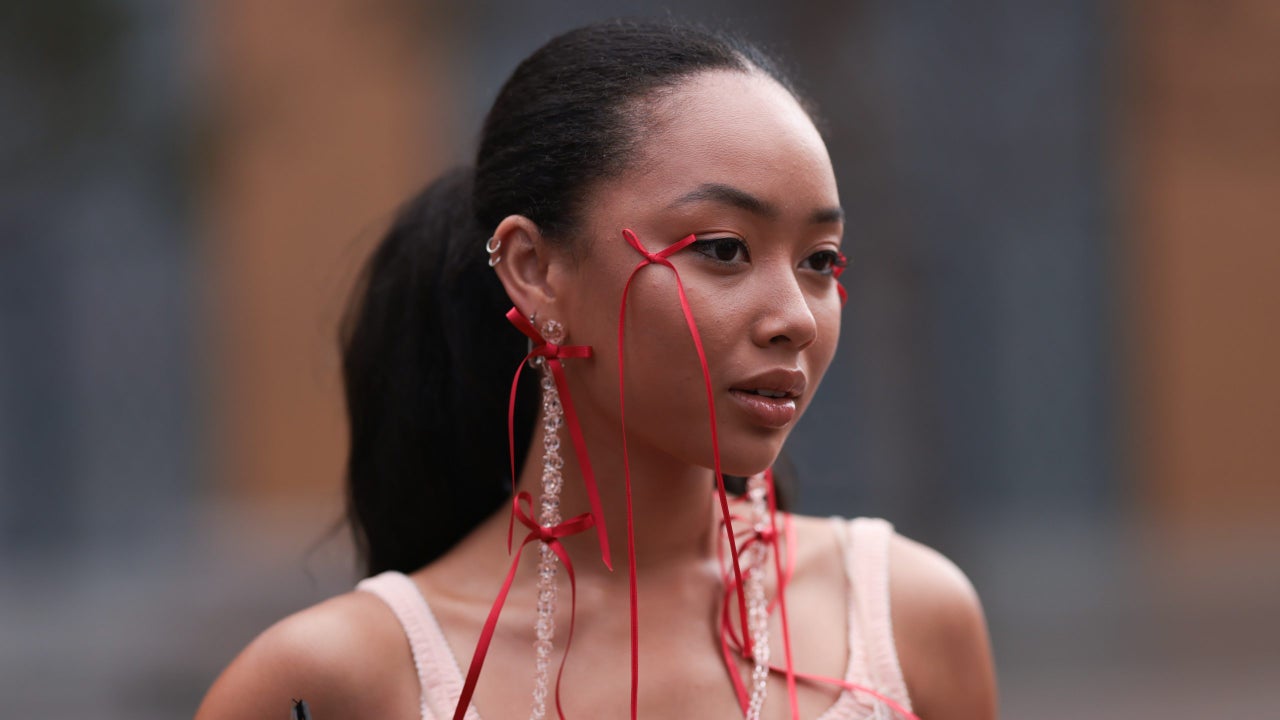For Black women, the “girlhood” trend is as much a practice of survival and bodily autonomy as it is an avenue to access joy.
2023 bleeding into 2024 was named the year of the “girl” by many online communities and publications. Pink bows and pigtails, the Barbie movie, and the lighthearted, somewhat satirical “I’m just a girl” mantra made its way across every social media app via TikTok. The “girlhood” trend found young women and girls bonding with each other through gender affirming beauty practices and girl-group pastimes in attempts to reclaim what male-centered society deems to be frivolous. In some ways, TikTok’s girlhood is to this Gen Z era as Tumblr’s “just girly things” was to the millennials’ coming of age. The interest in all things soft and fun hit its peak, and understandably so.
With political unrest rippling across the globe, the revocation of reproductive rights for many Americans, and a worsening economy to name a few, it’s no wonder why women and girls are leaning into the more playful aspects of their gender identity. Whether it be rooted in escapism, affirmation, or reclamation of self under the patriarchal gaze, the significance of this social-beauty trend’s popularity in today’s climate is not to be overlooked. As women and girls feed their desire to sit in the innocence of girlhood a while longer, or find comfort in gender-affirming rituals, it begs the question, “is this practice afforded to all women?”
Black women and girls have long had a complicated relationship to gender and femininity. Beauty, innocence, softness, and protection– elements largely associated with femininity– have not been historically our labels. Dr. Courtney Morris, Professor of Gender and Women’s Studies at UC Berkeley, reflects on the origins of this trend through the idea of returning to self and comes to two observations. The first sees that, “there are people who want to embrace it as a celebration of one’s youth; to re-experience the sense of wonder and possibility that young people have about the world. I think we tend to lose that sense of wonder, possibility, play and openness as we get older,” she explains. She also touches on another set of people who have a “Peter Pan complex” of sorts, and use the trend as a means to escape the responsibilities adulthood can bear.
Whether it be the former or latter, Morris believes “the more productive conversation would include asking ourselves, “why is it that this trend seems to appeal to so many people?” Pinpointing an answer to this question is not quite simple, however. “The difficulty of talking about phenomena like this while they’re happening is that we haven’t had enough time to really understand them. The data is still very much coming in.”
From an anthropological perspective, she hypothesizes that “nostalgia feels good,” and is a tool we look to collectively in times of crisis. “We’re living in a time that is really difficult, we’re watching all kinds of horrific things happen all over the globe, from the genocide that’s unfolding in Gaza to the crisis of democracy in the United States.” For many reasons, we are turning to this realm of girlhood as reprieve from the harsher realities of our everyday lives.
Dr. Omise’eke Tinsley, Professor of Black Studies at the University of California Santa Barbara first points to the Barbie movie when discussing the trend’s origins, and highlights the limitations of this form of feminism. “My understanding is that it came from the popularity of Barbie over the summer. It’s a version of girl power but also about a kind of simplicity that girlhood is, as opposed to womanhood. I’m gonna be really honest, I haven’t paid a lot of attention to it,” she admits. “It seems like a celebration of girl power, working together, and feminine innocence that doesn’t really seem to have much to do with Black women and girls.”
Tinsley expands by pointing to the scene with Ruth Handler, where a montage of memories between mothers and daughters depicts sensational expressions of childlike innocence, safety, and wonder. “I love being the mother of a girl. I absolutely love it. It’s the best thing in my life. But there’s never a time where I have that sense of safety or comfort. I don’t think that that’s what Black girlhood means. It’s valuable, and needs to be protected because it’s always been in danger.”
This notion of innocence, or lack thereof, is one that Professors Morris and Tinsley reckon with, as we delve into the relationship between Blackness, girlhood, and beauty. They both speak to the social norms that adultify Black girls, robbing them of innocence and grace, while at the same time refusing to acknowledge Black women’s womanhood and autonomy as they age. “There can’t just be one girlhood for everybody. Oftentimes things that are associated with Black girls aren’t thought of as being cute and are put down for different reasons, not simply because they’re feminine.”
Morris expands on this reality and suggests that being robbed of innocence is the very thing that may draw some Black women and girls to the trend, “No one thinks you’re innocent, no one presumes that we need to be cared for, or protected in certain kinds of ways that I can definitely see [the girlhood trend] as a sort of strategy and claim to this idea that, ‘I deserve to be protected.’ For Black women,” she continues, “[it’s more than] trying to hold on to an imagined girlhood ideal, but it can also be deeply healing in terms of giving yourself an experience of girlhood that you may never have gotten in a racist, sexist culture that constantly treats Black girls as far older than they actually are.”
Despite this adultification of Black girls– everything from disproportionately punitive discipline in school to oversexualization of their bodies– Black women and girls have a penchant for finding and creating beauty through their unique realities. “Whether jumping rope, or how we do our hair, there’s a sweetness to Black girlhood. It’s even sweeter because we survived so much violence, yet we still managed to create that sweetness for ourselves, through our relationships, and through our cultural practices,” Morris affirms.
Tinsley, who is the mother of a teenage daughter, recounts a time when she noticed her daughter going to middle school with a backpack full of their household hair products, taking them so she and her friends could do each other’s hair at lunch. Our hair rituals have long served as avenues to affirm, preserve, and connect with each other over our beauty. As beauty trends cycle in and out of style, hair remains a powerful storytelling vessel.
Additionally, Tinsley offers that even assuming each woman shares a common gender and central expression of said gender is a misstep leading to exclusion. A straight woman’s definition of beauty and femininity may differ from that of a queer woman. Similarly, Morris reflects on the differences between white and Black femininity. “I think for Black women, the conversation is not necessarily the desire to liberate myself as a woman by unburdening myself with femininity,” she says. “But really we want the right to be read as feminine on our own terms.”
“There’s always a hierarchy to feminine ease, [but] long acrylics, certain kinds of makeup, and hair aren’t made for manual labor.” Tinsley highlights that these beauty aesthetics, oftentimes coded as low-class and racialized, are in actuality impractical for hard labor and therefore should reinforce the idea of feminine ease that is not often afforded to the Black women who pioneered these styles. “You can’t really say it’s not feminine, but somehow it’s too much.” She believes that the Black and brown femmes who adorn themselves in this way are demonstrating a powerful practice in body autonomy by insisting that their “bodies are a work of art, not [simply] bodies for labor.”
By bypassing the limitations of the girlhood trend that reinforce specific beauty practices as “correct”, we can create space for niche beauty communities where subcultures shine through. The girlhood defined by spa treatments and pilates can be the same girlhood defined by Tiktok tutorials from formerly incarcerated women, demonstrating how they use what they have to DIY makeup products.The truly expansive and liberatory practice of the girlhood trend is the ability to identify all of the subversive things that can and should be considered “girlhood.”
“I don’t know that we fit into it based on dominant terms of the culture, but I do think there’s something interesting about the way Black women are claiming girlhood in the cultural forms we produce, that we don’t really get credit for,” says Morris. “I love to see Black women celebrating their girlhood so that younger people can see that. Ultimately, I hope we’d be able to create a world where little Black girls can thrive and they don’t have to wait until they get older to celebrate themselves.” Tinsley questions lightheartedly, “girlhood? Didn’t we already have Black girl magic and Black girl joy?” She affirms there is so much “we can do outside of trends, outside of the gaze, because a lot of this is ongoing practices, which has been happening before there was social media, and will still be happening after.” They both conclude that ultimately, Black women use girlhood and femininity as a means for survival.







